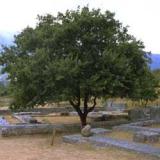Appropriation or syncretisation? Or maybe just the evolution in understanding? You decide.
Zeus is the Greek king of the gods, the god of sky and weather who fertilizes the fields and protects the home. He is the god of law, order and fate. He was typically depicted as a mature, regal man with a beard. Typical symbols associated with him: lightning bolt, eagle, ram, bull, snake, cornucopia and scepter.
...-
 This is a fascinating subject and a very nice overview of it. Honestly, though, I don't see where talk of "appropriation" comes in
This is a fascinating subject and a very nice overview of it. Honestly, though, I don't see where talk of "appropriation" comes in -
 Personally I'm never sure where the line of appropriation is...Americans can be "gaga" over anything and everything Native America
Personally I'm never sure where the line of appropriation is...Americans can be "gaga" over anything and everything Native America -
 The Greeks who came back from the grand tour of Egypt and sold fake Khemetic initiations for 10 talents were appropriating (like $
The Greeks who came back from the grand tour of Egypt and sold fake Khemetic initiations for 10 talents were appropriating (like $ -
 There's even a catchword for it: orientalizing. Exactly like what modern Pagans and esotericists do with India and Tibet (a distan
There's even a catchword for it: orientalizing. Exactly like what modern Pagans and esotericists do with India and Tibet (a distan -
 Interesting Zeus-Ammon has a great deal in common with Apollon Karneios in appearance (who was a Doric deity and a god brought to
Interesting Zeus-Ammon has a great deal in common with Apollon Karneios in appearance (who was a Doric deity and a god brought to
























